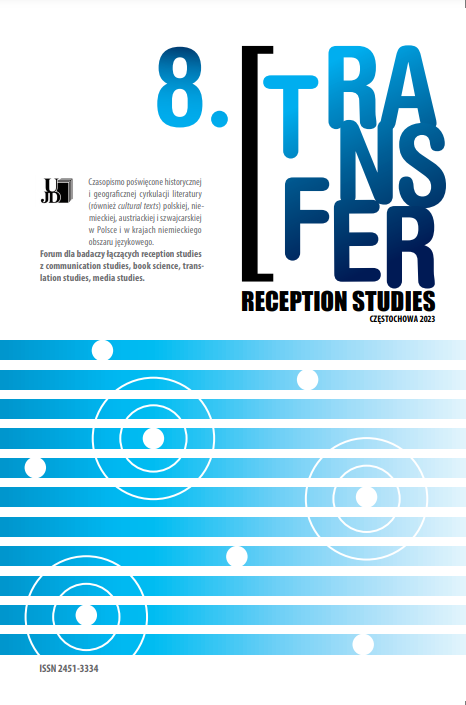The cultural potential of longing. Some philological reflections
Anna Majkiewicz
a.majkiewicz@ujd.edu.plJan Dlugosz University in Częstochowa (Poland)
Joanna Ławnikowska-Koper
Jan Dlugosz University in Częstochowa (Poland)
Abstract
The aim of this paper is to shed light on the (semantic, cultural) meanings implied by the word "longing" in a diachronic and synchronic perspective. Starting from the original meanings of the noun "longing" in Proto-Slavic, the authors aim to demonstrate that longing as a philosophical concept was first constituted in the Judeo-Christian tradition and that its basis was the idea of the imperfection of the human condition and the consequent striving for the ideal. With reference to the typology of nostalgia proposed by the Russian-American cultural theorist Svetlana Boym, two types of longing (restorative and reflexive) are distin-guished, the criterion for their separation being localisation of the object of longing on the time axis: past-future. The researchers argue that today we are dealing with an omnipresent longing, which on the one hand is due to the worrying situation in the world (e.g. the war in Ukraine) and, on the other hand, to the general tendency of today's world, i.e. the impossibility of reaching a state of fulfilment. The creative reflection of contemporary writers on experienced and/or expected loss ultimately confirms the cultural potential of the concept of longing.
Keywords:
Svetlana Boym, longing, restorative longing, reflective longingReferences
References
Boym, Svetlana. „Nostalgia jako źródło cierpień.” Translated by Iwona Boruszkowska. Ruch Literacki LX, no. 1 (352) (2019): 99. DOI 10.24425/rl.2018.124791. Google Scholar
Boym, Svetlana. The Future of Nostalgia. New York: Basic Books, 2001. Brückner, Aleksander. Słownik etymologiczny języka polskiego. Kraków: Krakowska Spółka Wydawnicza, 1927. Google Scholar
Corbineau-Hoffmann, Angelika. „Sehnsucht.“ In Historisches Wörterbuch der Philosophie online. Accessed December 1, 2022. https://www.schwa-beonline.ch/schwabe-xaveropp/elibrary/start.xav?start=%2F%2F*%5B%40attr_id%3D%27verw.sehnsucht%27%20and%20%40ou-tline_id%3D. DOI. 10.24894/HWPh.3768. Google Scholar
Heidegger, Martin. Rozprawa Schellinga o istocie ludzkiej wolności. Translated by Robert Marszałek. Warszawa: KR, 2004. Google Scholar
Gauger, Andreas. Jakob Böhme und das Wesen seiner Mystik. Berlin: Weißensee-Verlag, 2000. Linde, Samuel Bogumił. Słownik Języka Polskiego. Lwów: Zakład Ossolińskich, 1859, vol. V R.T. Google Scholar
Nowicki, Andrzej Rusław. „Filozofia tęsknoty do miejsc, od których jesteśmy daleko.” žurnal fìlosofìv slov'âns'kih krain, no. 2 (2002): 260-270. Google Scholar
Nowicki, Andrzej Rusław. Filozofia tęsknoty. Accessed December 1, 2021. http://www.racjonalista.pl/kk.php/s,6273/k,2. Google Scholar
Praktyczny Słownik Współczesnej Polszczyzny. Edited by Halina Zgółkowa. Poznań: Kurpisz, 2003, vol. 42. Google Scholar
Schelling, Friedrich Wilhelm Joseph. Filozoficzne badania nas istotą ludzkiej wolności i sprawami z tym związanymi. Translated by Bogdan Baran. Kraków: Inter esse, 2003. Google Scholar
Simon, Coen. Warten macht glücklich. Eine Philosophie der Sehnsucht. Darm-stadt: Theiss, 2015. Google Scholar
Słownik Języka Polskiego. Edited by Witold Doroszewski. Warszawa: PWN, 1967. Vol. 9 T-Wyf. Google Scholar
Sobota, Daniel R. Źródła i inspiracje Heideggerowskiego pytania o bycie. Vol. II: Filozofia życia, filozofia egzystencji i filozofia religii. Bydgoszcz: Fundacja Kultury Yakiza, 2013. Google Scholar
Tatarkiewicz, Władysław. O szczęściu. Warszawa: Wydawnictwo Naukowe, 2010. Google Scholar
„Tęskna ciekawostka.” Accessed Dezember 1,2021. https://www.nck.pl/projekty-kulturalne/projekty/ojczysty-dodaj-do-ulubionych/ciekawostki-jezykowe/TESKNA_CIEKAWOSTKA. Google Scholar
The Banshees of Inisherin. Directed, written, and produced by Martin McDonagh. Irlandia 2022. Google Scholar
Tokarczuk, Olga. Dom dzienny, dom nocny. Wałbrzych: Wydawnictwo „Ruta”, 1999. Google Scholar
Authors
Joanna Ławnikowska-KoperJan Dlugosz University in Częstochowa Poland
Statistics
Abstract views: 72PDF downloads: 38
License
Copyright (c) 2022 Transfer. Reception Studies

This work is licensed under a Creative Commons Attribution-NonCommercial-NoDerivatives 4.0 International License.
Most read articles by the same author(s)
- Anna Majkiewicz , Joanna Ławnikowska-Koper, Paul Martin Langner, An affective culture? From the Editors , Transfer. Reception Studies: Vol. 5 (2020)
- Joanna ŁAWNIKOWSKA-KOPER, The borders of bourgeois class (in)decency. Marcin Kołodziejczyk's Dysforia. Przypadki mieszczan polskich in the context of Polish reception of Gabriele Wohmann , Transfer. Reception Studies: Vol. 3 (2018)
- Anna Majkiewicz, Loneliness in the space between (Vor der Zunahme des Zeichen by Senthuran Varatharajah) , Transfer. Reception Studies: Vol. 6 (2021): AFFECTS 2 - CONTEMPORARY CULTURE OF EMOTIONS. TRANSFER. TRANSLATION. RECEPTION
- Joanna Ławnikowska-Koper, German-language literature in Switzerland without taboos , Transfer. Reception Studies: Vol. 5 (2020)
- Anna Majkiewicz, Migrant and Nomad: Identity in Flux – A Trend or Necessity? , Transfer. Reception Studies: Vol. 4 (2019)
- Joanna ŁAWNIKOWSKA-KOPER, Reception of Erich Hackl's works in German speaking countries and in Poland , Transfer. Reception Studies: Vol. 1 (2016): CIRCULATION OF GERMAN-LANGUAGE AND POLISH LITERATURE IN THE XXI CENTURY
- Joanna ŁAWNIKOWSKA-KOPER, Barbara Frischmuth's (Non-)Presence in Poland: The Presence and Reception of her Works in the German-Speaking World and in Poland , Transfer. Reception Studies: Vol. 2 (2017)
- Joanna Ławnikowska-Koper, Anna Majkiewicz, Od redaktorek , Transfer. Reception Studies: Vol. 3 (2018)
- Joanna ŁAWNIKOWSKA-KOPER , Zrozumieć obcość. Recepcja literatury niemieckojęzycznej w Polsce po 1989 roku, red. Monika Wolting, Stephan Wolting, Universitas, Kraków 2016, ISBN 978-83-242-2784-6, ss. 540 , Transfer. Reception Studies: Vol. 2 (2017)
- Joanna ŁAWNIKOWSKA-KOPER, „Lilith spotyka Kalliope. Austria czyta, dyskutuje i tłumaczy” – międzynarodowa konferencja naukowa i warsztaty, Opole 1–11.04.2018 , Transfer. Reception Studies: Vol. 3 (2018)
Similar Articles
- Aleksandra Budrewicz, Does contemporary Penelope miss her husband? On the interpretations of Penelope in literature in the 20th century , Transfer. Reception Studies: Vol. 7 (2022)
- Gabriela Jelitto-Piechulik, Longing for the past and its new discovery in reportages about Galicia , Transfer. Reception Studies: Vol. 7 (2022)
- Anna Gajdis, Topographies of the Works of Artur Becker , Transfer. Reception Studies: Vol. 4 (2019)
You may also start an advanced similarity search for this article.

